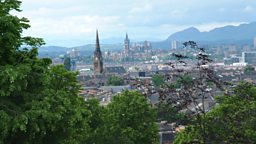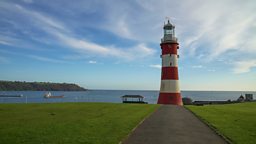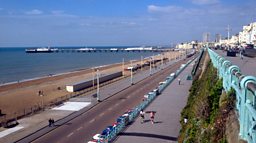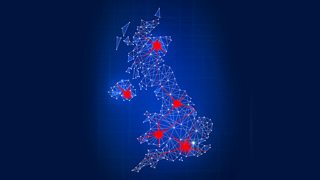What our internet searches say about us
Wherever we live and whatever we do, we leave behind a trail of numbers. The Office for National Statistics gathers data on everything – the economy, employment, even our wellbeing – and there is more data available than ever before, largely due to the online searches we make every day. Increasingly, the government and big businesses are making crucial judgments based on these statistics.
But these numbers can't tell us everything. Take a look at some of the true stories behind the figures.

-
![]()
Hotspot
Jenny Kleeman visits five locations that come top of the table for a national statistic.
Glasgow is Britain’s bingo hotspot
Mecca Forge in the East-end of Glasgow is the largest bingo hall in the UK, and Glasgow – according to the Bingo Association – is the city with the most bingo halls. The question is why?
The game has a rich history here. When cinema was struggling in the 60s and 70s, bingo filled the empty halls. Jacqueline, who dishes out the winnings at the end of each game, has her own theory for why the game thrived. When she was 18, she says, she wouldn’t have gone into a pub alone like woman do now. Instead, she would play bingo because it was “a safe environment.” Women came to the bingo hall because it was “a very safe place to go” – and generations of women are still playing the game together now.
Mecca Forge’s manager, Paul, believes that – unlike in Edinburgh – the bingo stalwarts haven’t been pushed out to the suburbs by young professionals moving into the city. Families still stay in the same house for generations, and “that’s one of the great things that has kept bingo buoyant in Glasgow.”
Aldershot has the highest number of Buddhists
How did a small town in Hampshire become a Buddhism hotspot?
The thriving religious community in Aldershot is, incongruously, a result of its military past. The Hampshire town was once the home of the largest military base in the country. When the Gurkhas – a Nepalese regiment of the British army – received the right to settle in the UK, many chose to live in Aldershot because of the town’s historic links with their regiment. It’s now home to a greater proportion of Buddhists than anywhere else in England and Wales, according to the 2011 Census. The Dalai Lama even visited the town in 2015 to open the town’s Buddhist Community Centre.


Plymouth has the highest rate of personal debt
Personal insolvency is when people who are unable to pay debts enter into formal procedures like going bankrupt. Seaside towns regularly dominate the Insolvency Service’s annual data of the locations with the highest rate of personal insolvency and, according to these statistics, Plymouth has a higher rate of personal insolvency than anywhere else in Britain.
Bill is a debt relief caseworker at the Citizens Advice Bureau in the city. He says it could be Plymouth’s naval past that is behind the figures. Although unemployment isn’t as high as in other places, he says, they do have a lot of low-income and zero hour contracts. Historically, one of the biggest employers was the dockyard and a naval base, which “has probably shrunk from maybe 12,000 in its heyday down to about three or four now”, says Bill. “Of course the jobs aren’t replaced with equal jobs”, the caseworker states, but part-time roles. Perhaps Plymouth’s naval past goes some way to explaining the culture of debt in this seaside city.


Copeland in Cumbria is the most affordable place to buy a home
According to the Office for National Statistics, the Copeland borough of Cumbria is the most affordable place to buy a home in England and Wales. Why? The Sellafield nuclear site holds the answer.
The average person in England and Wales can buy a home for around eight times their yearly pay packet but in Copeland the median house price is just two and a half times the median yearly annual salary. The Sellafield staff earn high average annual salaries whilst house prices in the area remain low. Copeland is the most affordable place to buy a home because it has hit a sweet spot where low house prices are combined with high average wages.
Brighton has the highest rate of internet searches for the word “lonely”
According to Google Trends, Brighton is the most popular location in the UK for Google searches of the word “lonely”. Could this reveal an isolation epidemic in the city that's largely hidden from view? We know loneliness has become a serious problem in Britain, with the government appointing an inaugural minister for loneliness to try and tackle the crisis.
But Brighton’s internet search history doesn’t necessarily mean it’s the place where loneliness is most prevalent. It could be that the city’s citizens are the most aware of their loneliness – and more willing to look for help. Pat O’Byrne, a 87-year-old widow from Brighton, went viral last autumn when she posted a message on Facebook seeking someone to share a Sunday Roast with. Pat was inundated with offers from strangers from all over the world, with her plea attracting responses from as far afield as Japan and Canada.

-
![]()
Hotspot
Jenny Kleeman explores places at the extremes of UK society.
-
![]()
Six reasons why making mistakes can be good for you
No one likes making mistakes, but it isn’t always such a bad thing.
-
![]()
Ways you are being influenced without even realising it
The enigmatic social science that's controlling you right now.
-
![]()
How to have a constructive argument
Disagreement can help us reach better outcomes – it’s just how we go about it.





